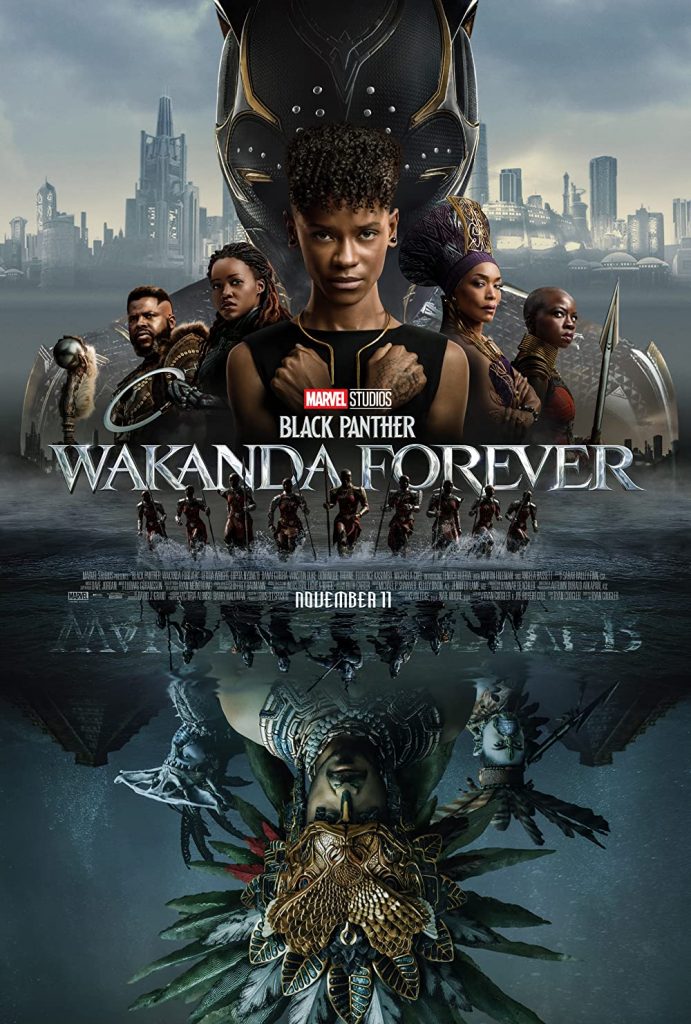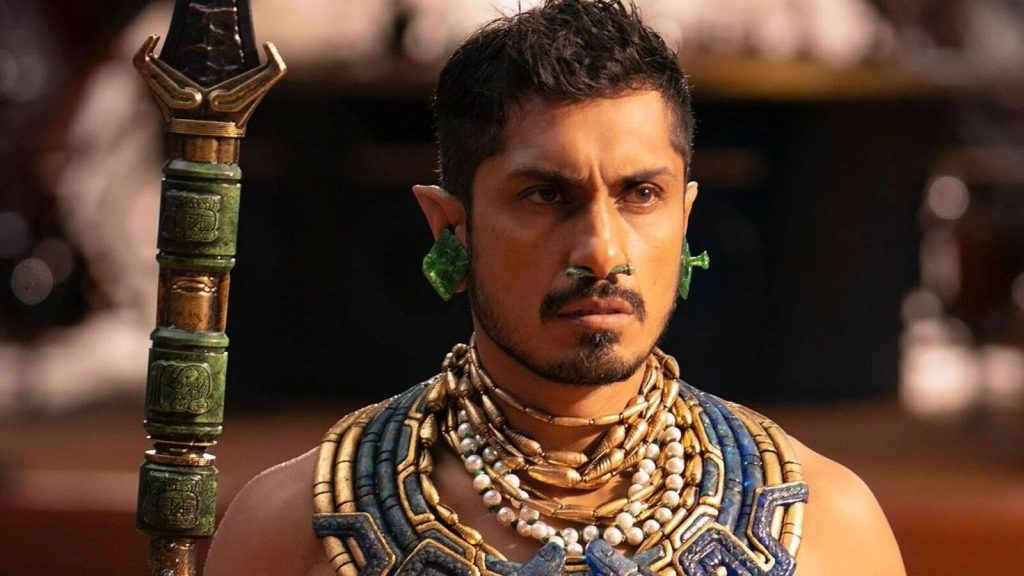For the most part, the movies from Phase Four of the Marvel Cinematic Universe have been a train wreck. Thus far, Spider-Man: No Way Home reigns supreme by a landslide. For 2022, three movies have been released. Doctor Strange: The Multiverse of Madness was a letdown considering the hype that its trailer conveyed while Thor: Love & Thunder became the MCU equivalent of either Batman & Robin (1997) or The Return of Swamp Thing (1989). The most-recently released third film is also a franchise sequel. Though it’s the better film of the three, it’s not overwhelmingly so and certain not better than the original. Criticism notwithstanding, Black Panther: Wakanda Forever pays tribute to its titular king, portrayed by the late Chadwick Boseman.
Title: Black Panther: Wakanda Forever
Released: November 10th, 2022
Director: Ryan Coogler
Starring: Letitia Wright, Lupita Nyong’o, Danai Gurira, Winston Duke, Tenoch Huerta, Martin Freeman, Julia Louis-Dreyfus, and Angela Bassett.
PLOT: The film begins with Shuri (Leticia Wright) scrambling to save her dying brother, T’Challa, from an unspecified illness. The heart-shaped herb’s garden was destroyed by Killmonger (Michael B. Jordan) in Black Panther (2018) and Shuri tries to recreate the herb to save her brother, but to no avail. Over a year later, Queen Mother Ramonda (Angela Bassett) assumes the position as ruler of Wakanda and is under pressure from the world’s governments to share their most precious commodity, Vibranium. They even hire mercenaries to infiltrate Wakanda to steal Vibranium, much to their embarrassment. Shuri, having had no time to allow herself to grieve, refuses to recreate the heart-shaped herb and scoffs at the idea of a new Black Panther despite her mother’s urgings.
Meanwhile, a U.S. government team of scientists, Navy SEALs, and C.I.A. agents utilize a Vibranium detecting machine invented by M.I.T.-tech wizard RiRi Williams (Domnique Thorne) to locate the metal under the Atlantic Ocean. However, they’re attacked and killed by a group of blue-skinned, aquatic super-powered beings led by Namor (Tenoch Huerta), ruler of an underwater kingdom of Aztec-Mayan descent called Talokan. The Talokanil were originally indigenous people, and though their exposure to the heart-shaped herb centuries ago greatly enhanced them, it made them blue-skinned and only able to survive in water. Because Namor is not-blue skinned, looks Mayan, and has abilities his subjects don’t (such as wings on his ankles that allow him to fly), he is considered a mutant.
Everett K. Ross (Martin Freeman) returns as the C.I.A. liaison and secretly assists the Wakandans with finding RiRi before the Talokanil do. Namor blames Wakanda for Vibranium and wants to kill RiRi Williams for her part in creating the detection machine that’s disturbed his kingdom. When he infiltrates Wakanda, he tells Ramonda and Shuri as much and that the will bring destruction to Wakanda if his demands aren’t met. What ensues is a reluctant hero’s journey, one fraught with tragedy, surprises, and twists that shape the future of the technologically-advanced nation.
MY TAKE: I knew going into the film that, without Chadwick Boseman, it wasn’t going to have the same spirit or be as good as the first Black Panther. Now, that film I saw three times during the opening weekend and declared that I loved it the same way White women love the TV series Friends. It pays tribute to T’Challa and Mr. Boseman, the acting was solid, and clearly there were rewrites to the story after Boseman’s death. Speaking of the story, Ryan Coogler must’ve been watching James Cameron movies when he wrote the screenplay. Because, with the character of Namor and the Talokanil, I can see elements of both The Abyss (1989) and Avatar (2009). I like Huerta’s portrayal of Namor and how the MCU now officially has its first mutant character (although Mr. Immortal and El Aguila from She-Hulk: Attorney At Law are also mutants, they weren’t designated as such).
Additionally, since they couldn’t use terms such as “Atlantis” or “Atlantean” because of the DC film Aquaman (2018), the MCU chose to have Namor and his people’s backstory tied to Aztec-Mayan culture. Thematically, Ryan Coogler once again attaches a sociological issue to the film to add some layers. In the first BP, the diaspora of Black Americans and Black Africans was explored via the character of Killmonger. For the sequel, the practice of colorism is embodied by Namor, who is markedly different from the subjects he rules over.
Many believe the film to be “woke”, largely because of the film showing two members of the Wakanda military, the Dora Milaje, to be in a same-sex relationship. However, the prevalent theme I saw in the film was #BlackGirlMagic. Characters like Ramonda and Okoye (Danai Gurira) were given character development, as was Shuri since she is now the central character. She’s a flippant young woman of science, but when Namor makes his appearance in a major way in Wakanda, her vengeful ardor is ignited by a most unlikely source. The #BlackGirlMagic theme is exemplified (and stated) by RiRi Williams. She’s basically a Black female Tony Stark, a tech genius attending M.I.T., just as he (and Killmonger) did. She’s introduced here as a prelude to her upcoming series IronHeart. Though I like Thorne’s portrayal, I didn’t think the character needed to have as big of a role as she had here in Wakanda Forever. Also, this theme has caused it to draw comparison to Viola Davis’ historical epic The Woman King.
Not to take anything away from the male characters. Winston Duke’s M’Baku has evolved as well. The Jabari are no longer isolated from the general run of Wakanda, but without a king, he too is lost, but wants to move forward. Valentina Allegra de Fontaine from Falcon & The Winter Soldier is reprised by Julia Louis-Dreyfus and is revealed to be Ross’ ex-wife, but she has no real place in the movie. She should be restricted to Marvel’s TV programs and is only here to throw her weight around as the new C.I.A. director.
Fair warning, there’s a mid-credit scene, but no post-credit scene, so don’t waste your time. Additionally, the Black Panther franchise kind of parallels the Avengers film franchise: The first films of both respective franchises were phenomenal hits and, though the sophomore outings had the same directors at the helms, they just weren’t on the same level as their predecessors. There’s filler material and filler characters in the film, and doesn’t hit all the same marks as the original. But I’d say Ryan Coogler is now 4/4 with this film.




